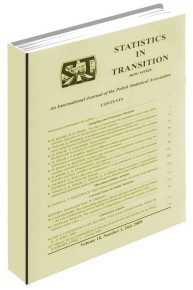THE EFFECT OF BINARY DATA TRANSFORMATION IN CATEGORICAL DATA CLUSTERING
THE EFFECT OF BINARY DATA TRANSFORMATION IN CATEGORICAL DATA CLUSTERING
Author(s): Jana Cibulková, Zdeněk Šulc, Sergej Sirota, Hana ŘezankováSubject(s): Business Economy / Management
Published by: Główny Urząd Statystyczny
Keywords: hierarchical cluster analysis; nominal variable; binary variable; categorical data; similarity measures; evaluation criteria; generated data
Summary/Abstract: This paper focuses on hierarchical clustering of categorical data and compares two approaches which can be used for this task. The first one, an extremely common approach, is to perform a binary transformation of the categorical variables into sets of dummy variables and then use the similarity measures suited for binary data. These similarity measures are well examined, and they occur in both commercial and non-commercial software. However, a binary transformation can possibly cause a loss of information in the data or decrease the speed of the computations. The second approach uses similarity measures developed for the categorical data. But these measures are not so well examined as the binary ones and they are not implemented in commercial software. The comparison of these two approaches is performed on generated data sets with categorical variables and the evaluation is done using both the internal and the external evaluation criteria. The purpose of this paper is to show that the binary transformation is not necessary in the process of clustering categorical data since the second approach leads to at least comparably good clustering results as the first approach.
Journal: Statistics in Transition. New Series
- Issue Year: 20/2019
- Issue No: 2
- Page Range: 33-47
- Page Count: 15
- Language: English

